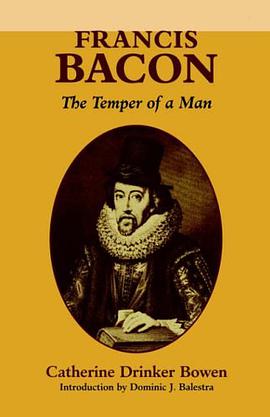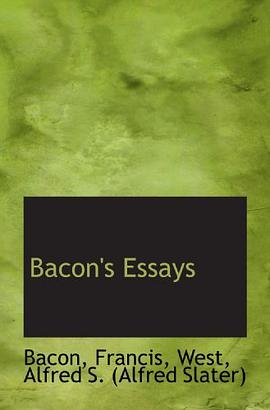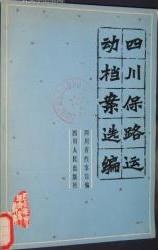

具体描述
The portrait Bowen paints of this controversial man, Francis Bacon (1561-1626), balances the outward life and actions of Bacon with the seemingly contradictory aspects of his refined philosophical reflections. When Bacon's more notorious attributes are set in historical context, his actions seem less personally vindictive against the backdrop of an entire age seemingly devoted to the very vanity and ingenuousness with which he is so often accused. As Lord Chancellor of England, Bacon was impeached by Parliament for taking bribes in office, convicted, and banished from London an the law courts. In a prayer Bacon composed during the interval following his punishment, he reveals that the dichotomy of his existence was no more deeply felt than by himself, and he readily admits that his obligations to society were not as suited to his nature as the study of philosophy, science and law. Modem scholars hold Bacon's philosophical works, "Novum Organum", "Advancement of Learning" and "New Atlantis" as his greatest achievements. Bowen's story reveals a man whose genius it was not to immerse himself in the rigour of scientific experimentation, but to realise what questions science should ask, and thereby reach beyond the status quo and appeal to the wider imagination of his generation. In his writings, Bacon challenged established social and religious orders, raised questions about mind/body relation and the role of dreams, and foresaw the day when scientists at colleges and universities would share experimentation. It is Bacon's legacy to have gone beyond his age and, out of pure intuition, anticipate the concerns of future generations.
作者简介
目录信息
读后感
评分
评分
评分
评分
用户评价
我必须承认,我对这类人物传记通常持谨慎态度,总担心会陷入对个人私生活的过度渲染或空泛的赞美之中。然而,这本书真正让我眼前一亮的是它对培根作为法官和政治家那一面的公正刻画。作者并没有回避他晚年所遭受的那些政治丑闻和腐败指控,而是将其置于都铎王朝末期错综复杂的权力斗争的大背景下进行考察。这种不偏不倚的立场,使得我们能更全面地理解一个伟大思想家是如何在充满限制和诱惑的现实世界中挣扎求存的。书中的某一章专门分析了培根在处理司法案件时所体现出的实用主义精神,这与他在自然哲学中所倡导的理性探究形成了有趣的张力,让人不禁思考:一个人的理论抱负与其实际行为之间,究竟能保持多大的距离?这种对人性复杂性的挖掘,让冰冷的历史人物瞬间变得立体和真实,远非那些只歌颂其功绩的片面之作可比。
评分读完这本关于培根的书,我的感受是复杂而又震撼的。如果说前些部分还沉浸在对伊丽莎白一世宫廷政治的描绘中,那么进入到他对于“偶像”(Idols)的系统阐述时,那种豁然开朗的感觉是无与伦比的。作者的笔触在这里变得异常灵动,他没有采用枯燥的哲学说教,而是通过生动的比喻和现实生活中的例证,将培根那些抽象的认识论障碍剖析得淋漓尽致。特别是关于“市场之偶像”和“戏剧之偶像”的论述,简直可以作为现代公关和媒体素养的教科书。我发现自己不自觉地开始审视自己日常交流中的偏见和误区,这种即时的反思体验是阅读其他哲学著作时很少能获得的。这本书的叙事节奏掌握得非常好,在学术的严谨和大众的可读性之间找到了一个绝佳的平衡点,让那些原本以为难以企及的文艺复兴思想,变得触手可及,充满生命力。
评分我不得不说,这本书在解读培根对后世影响这一点上,处理得相当高明。它没有停留在简单地罗列“谁受到培根影响”,而是深入探讨了培根思想中的某些“缺陷”或“遗漏”是如何在后来的启蒙运动中被批判和修正的。作者花了大量篇幅讨论了培根对数学和纯粹理论推演的相对轻视,以及这种倾向如何间接影响了十七世纪科学共同体的早期发展方向。这种辩证的分析,使得全书的论述充满了动态感和历史穿透力,它让我们看到,伟大的思想家并非神坛上的完人,他们的局限性也同样具有研究价值。对于习惯于接受传统赞美之词的读者来说,这种批判性的审视无疑是清醒而及时的。它引导我跳出了对培根的“神化”,转而从更具人文关怀的角度去理解这位对现代世界奠定基础的先驱者。
评分这本关于弗朗西斯·培根的著作,真是一场智力上的冒险。作者以一种近乎学术的严谨态度,深入剖析了这位文艺复兴时期思想巨擘的内心世界和哲学体系。我尤其欣赏他对培根早期思想演变轨迹的细致描摹,那种层层递进的论证方式,让人仿佛置身于那个思想激荡的年代,亲眼见证了“知识就是力量”这一口号是如何从萌芽走向成熟的。书中的大量一手资料引用,既保证了内容的权威性,也使得阅读过程充满了发现的乐趣。对于任何一个对现代科学方法论的起源感兴趣的人来说,这本书无疑是一份厚重的礼物。它不仅仅是关于一个历史人物的传记,更是一部关于人类理性如何挣脱中世纪束缚的史诗。尽管部分关于逻辑学和归纳法的探讨略显晦涩,需要反复揣摩,但这恰恰体现了作者对原著理解的深度,迫使读者也必须提高自己的认知水平才能跟上其步伐。总而言之,这是一本需要静下心来细细品味的佳作,其价值远超一般的历史读物,更像是一份精心编纂的思想导览图。
评分这本书的排版和插图设计简直是一场视觉盛宴。作为一名对文艺复兴时期艺术和科学交叉领域有浓厚兴趣的读者,我惊喜地发现,作者巧妙地将许多罕见的早期科学手稿插图和肖像画融入了文本之中。这些视觉材料并非简单的装饰,而是与论述内容紧密配合,比如在讨论培根对炼金术的摒弃时,配上的那些充满神秘色彩的版画,极大地增强了文本的说服力和沉浸感。阅读体验因此被提升到了一个新的层次,仿佛不是在读一本纯粹的理论著作,而是在翻阅一本精心策划的博物馆特展图录。作者在处理培根的“新工具”时,其细致入微的描述,结合那些图示,使得读者可以清晰地想象出当时实验环境的简陋与思想之宏伟之间的巨大反差。这种对细节的极致追求,无疑是这本书成为案头常备参考书的重要原因。
评分 评分 评分 评分 评分相关图书
本站所有内容均为互联网搜索引擎提供的公开搜索信息,本站不存储任何数据与内容,任何内容与数据均与本站无关,如有需要请联系相关搜索引擎包括但不限于百度,google,bing,sogou 等
© 2026 book.wenda123.org All Rights Reserved. 图书目录大全 版权所有




















